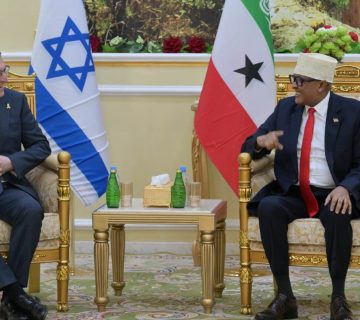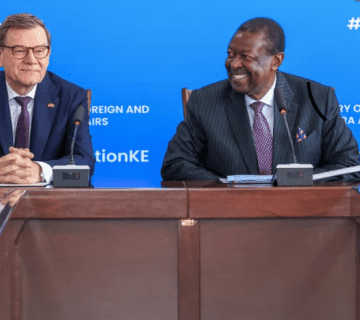The report of the seven-member fact-finding commission formed in December last year to investigate Somalia’s claims for cutting diplomatic ties with Kenya on December 15, 2020 has substantially absolved Kenya of the accusations levelled against it by Somalia. The commission was formed under the auspices of the Inter-Governmental Authority on Development (IGAD) following the 38th IGAD Summit in Djibouti on December 20, 2020. Somalia had alleged interference in its domestic affairs, breach of its sovereignty and undermining of its national security by Kenya. Among other claims, Somalia had accused Kenya of violating its airspace, maintaining closer ties with Somalia’s Jubaland federal member state and its leadership. Somalia further accused Kenya of creating, training and harboring a Somali militia group loyal to Jubaland’s Security Minister Abdirashid Janan. The country went further to accuse Kenya Defense Forces (KDF) which serve under the African Union Mission in Somalia (AMISOM) of dereliction of duty and mandate, and participating in illegal sugar trade and coal through the port of Kismayu, thereby strengthening al Shabab’s positions and financial base.
The Commission’s Findings
The IGAD fact-finding commission found no evidence of Kenya Defense Force (AMISOM) participation in illegal sugar and charcoal trade and further cited United Nations Security Council Resolution 2551 banning the trade and imposing sanctions on any entity found in contravention of the ban. The commission similarly found no evidence linking Kenya to AMISOM-KDF operations in Somalia since the troops are under AMISOM command and control, and further voided claims of Kenya harboring Jubaland militia and undermining Somalia’s sovereignty through its ties with Jubaland. The report noted Kenya’s role and sacrifice in the security and stability of Jubaland in its fight against al Shabab terrorist group, which further threatens Kenya’s own national security.
Wrong Signal and Turmoil in Somalia
While the diplomatic crisis between Kenya and Somalia has been subjected to independent and balanced review by a regional mechanism and found unwarranted, Somalia has sent a wrong signal in the region. For unjustifiably cutting diplomatic ties, escalating tensions with Kenya, undermining peacekeeping efforts and exposing the peacekeeping mission, Somalia has exposed its negative diplomatic practice and understanding of stakes involved. Maturity, objectivity and acceptable diplomatic conduct are expected of Somalia as it works its way to reclaiming its rightful place in the international community. As such, Somalia’s dramatic and capricious escalation of tensions with Kenya, which has contributed more than any other regional country and continues to support Somalia’s stability and prosperity since 1991, fall beneath conventional diplomatic practice and norms.
Somalia’s recent actions of pursuing aggressive posture towards Kenya and by extension Djibouti, which are its immediate southern and northern neighbors respectively, may further lead to its isolation instead of re-integration in the Horn of Africa, and undermine its own national security by formenting hostility with its neighbors. Continued pursuit of this path in the wake of IGAD’s report, may further lead to Somalia’s censure by the regional body and undermine efforts towards regional integration in the Horn of Africa.
While it is expected that Somalia’s security, stability and prosperity are dependent on its leveraging of interdependent external relations and quality of diplomacy, its aggressive regional character and negative role in regional conflicts such as the ongoing armed conflict in Ethiopia’s northern region of Tigray, undercut those prospects.
Aggressive Policy
However, it is not only the aggressive regional character which threatens Somalia’s security, stability and prosperity, but also the ongoing internal electoral, political, and constitutional crises. The incumbent President of Somalia, Mohammed Abdullahi Farmaajo, has virtually single-handedly plunged the country into a condition of potential collapse by undermining transition, reforms (political, constitutional and economic), independent institutions, federal member states, and poorly committing to security sector reform. The aggregate impact of Farmaajo’s parochial neopatrimonialism is the current electoral impasse in which all election deadlines have been missed, and opposition parties and candidates, and some federal member states have threatened to boycott polls and plan to reject alternative federal elections and outcomes as illegitimate. The president’s term expires in less than weeks amid the electoral crisis, sustained federal-regional conflicts, resurgence of al Shabab activities and attacks, and impeding AMISOM withdrawal. It is thus plausible to argue that Farmaajo’s pursuit of aggressive policy towards Kenya is a diversionary tactic to ease domestic pressure on his government to ensure democratic transition, which is the hallmark of Somalia’s stabilization process.
Implications on Kenya-Somalia Relations
The IGAD report’s findings while absolving Kenya of role in the diplomatic crisis with Somalia, it further finds Somalia’s cutting of ties with Kenya unjustifiable and criticizes Somalia’s handling of its relations with Kenya. The IGAD Commission recognizes the intricate inter-connected political, economic and social relationship between Kenya and Somalia thereby advising caution in the manner in which the relations between the two countries are managed. At stake are about 267,000 Somali refugees are hosted in Kenya’s Kakuma and Dadaab refugee camps as well as those integrated among Kenya’s urban areas, and also the two countries share cross-border Somali ethnic group. Kenyan exports to Somalia are valued at USD 116.03 million, while Somalia’s annual investment and trade with Kenya runs into millions of dollars.
Additionally, over 3,000 Somali children are enrolled in Kenya’s education system. Kenya is a crucial security partner especially in counter terrorism in Somalia, for the Somali government, the United States, the United Kingdom and the United Nations and has contributed towards significant gains against al Qaida’s affiliate in Somalia, al Shabab. The IGAD commission in its report further observes that Somalia’s actions risk exposing the gains made in counter terrorism in Somalia by unfairly casting aspersions on AMISOM contingents, undermining the mission’s credibility and legitimacy, and ultimately frustrating peacekeeping objectives. Thus, Somalia will need to rethink its hostile diplomatic posture towards Kenya and be open collaborate on issues of mutual interest including working with important internal and external stakeholders to ensure successful elections.
Edmond J. Pamba is a Research Assistant at the HORN Institute.
Photo: Kenyan President Uhuru Kenyatta (left, foreground), Prime Minister Abiy Ahmed of Ethiopia (left, background), Somalia President Mohamed Abdullahi (right, background) and Ismaïl Omar Guelleh of Djibouti (right, foreground) at past meeting (Photo Credit: Nation.Africa)



